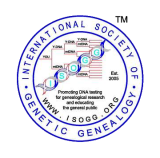Mitochondrial DNA tests
From ISOGG Wiki
comparison of 23andMe mtDNA results vs FTDNA FGS vs HVR 1/2/3 results
Either this page or http://www.isogg.org/mtdnachart.htm should mention a comparison between results obtained from 23andMe vs results from FTDNA's mtFullSequence [AKA FGS] , vs. other HVR1 /2 /3 test results. If such discussion exists here, I couldn't find it in a very brief search -in fact I was surprised not to find discussion of mtDNA "full genome sequencing". I'd rather not write it myself since I'm not at all familiar with the details.
I'm sure Ann Turner & others have commented in the DNA Email lists; those comments could be ref'd here.
If nothing else, there is some discussion at http://vps1.jameslick.com/dna/mthap/FAQ.html quoted below:
Q. Why do I get one haplogroup assignment from one testing service, a different one from another testing service, and yet another from mthap? A. There are four different aspects which affect this answer: 1) accuracy of the test, 2) completeness of the test, 3) the haplogroup reference used, and 4) how the results are interpreted. See the following questions for more on these four subjects.
Q. What is the accuracy of the various tests available? A. The best accuracy available is through sequencing. Sequencing determines each base in the genetic sequence. It is a mature technology which offers the highest degree of accuracy. FTDNA is probably the best known testing service which offers sequencing. The other type of test is genotyping done by a micro-array. Genotyping is good, but offers 99.8%-99.9% accuracy overall. However, the accuracy of mtDNA genotyping is less than this due to the short length of the genetic sequence and the presence of clusters of mutations relatively close together. Genotyping also is unable to determine results for some markers (no-calls), so even if the test covers relevant markers, some of those markers may not have any result.
Q. How complete are the various tests? A. The only complete and most accurate test available is an mtDNA FGS (Mitochondrial DNA Full Genetic Sequence). You can only have complete confidence in your haplogroup assignment if it is based on this test. Next in accuracy is a detailed genotyping such as offered by 23andMe. 23andMe currently tests about 2000 positions covering about 12% of mtDNA [EDIT: the ISOGG Wiki says 3000 SNPs], but that covers the vast majority of positions needed to make an accurate haplogroup determination. For most people, these results will be sufficient to determine the haplogroup very accurately, but not always. Because some necessary positions are not tested, and because genotyping is not 100% accurate, it cannot always yield an exact haplogroup assignment. It's not quite as good as an mtDNA FGS, but it very often will be able to make an accurate assignment. The entry-level sequencing tests only sequence a part of mtDNA. The most basic test looks only at a segment called HVR1, while a slightly more advanced test looks at HVR1 and HVR2. (One testing company even has something called HVR3 which other companies include in HVR2.) These tests are enough to get an approximate haplogroup assignment most of the time, but usually cannot be very specific. In some cases a haplogroup determination based on these tests can be wrong. Likewise, the genotyping offered by deCODEme only tests 162 positions, and usually can only approximately determine a haplogroup. You shouldn't put too much faith in haplogroup determinations made based on the type of tests discussed in this paragraph. It will be at best approximate for most people.
___________ Edit: I haven't seen James Lick's utility http://vps1.jameslick.com/dna/mthap/ before now. I just now looked at the discussion here http://dna-forums.com/index.php?/topic/12107-mtdna-analysis-tool/page__st__40?s=d643e02e2c2a158cc299ba7e12adbda9 , and between the thoroughness of his faq page (see link above), and this DNA-forums discussion I am *extremely* impressed. This tool deserves to be mentioned (by someone more knowledgeable) along with discussion of 23andMe mtDNA results -and their interpretation- , SOMEwhere on these Wiki pages!
Understanding mtDNA testing
This section lists only two blog posts, each six years old. Considering these are both from blogs, would it make sense to merge them into the Blog posts section? Ed Williams (talk) 08:35, 10 September 2019 (EDT)
